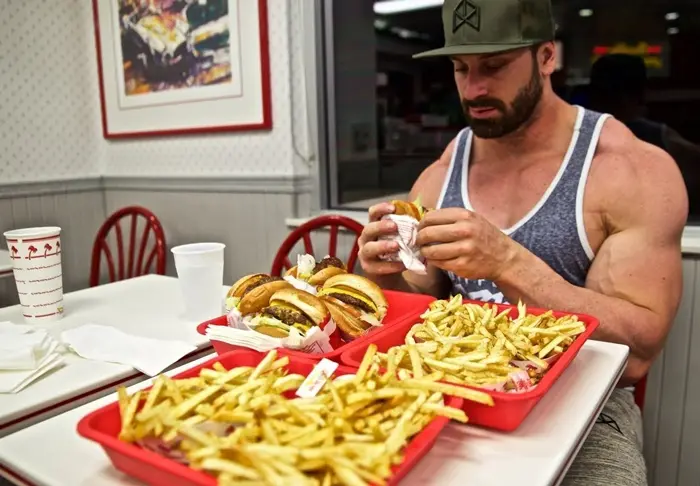A majority of people join a gym to lose weight. Fat loss programs require a calorie deficit, meaning you must burn more calories daily than you consume. Although weight loss sounds straightforward on paper, it is seldom the case in real life.
Even though many folks switch to a calorie deficit program to fulfill their weight loss ambitions, only a few possess washboard abs like Zac Efron in Baywatch (2017). Sticking to a calorie-deficit diet can be incredibly frustrating. Plus, when you don’t see the desired results, it adds to the disappointment. [1]
Staying in a calorie deficit for a prolonged period can lead to lethargy, lower hormone levels, increased hunger, and tiredness. All these factors are counterproductive to your weight loss goals and can cause a weight loss plateau.
This is where refeed days shine. Refeed days consist of increasing your caloric intake while focusing on carbohydrates. It can help counter the side effects of staying in a calorie deficit for an extended time.
This article dissects refeed days, what makes them tick, their benefits, and their drawbacks. We also touch upon who should include the refeed days into their diets and folks who should stay away from them. We round up this article with how you can incorporate refeed days into your diet program.
What is a Refeed Day?
Level Up Your Fitness: Join our 💪 strong community in Fitness Volt Newsletter. Get daily inspiration, expert-backed workouts, nutrition tips, the latest in strength sports, and the support you need to reach your goals. Subscribe for free!
Refeed days include eating close to your maintenance calories during a weight loss program, which otherwise requires you to stay in a calorie deficit. Depending on your weight loss goals and genetics, you could also enter a calorie surplus to supercharge your fat loss progress.
The majority of these additional calories come in the form of carbohydrates. Unlike a cheat day, a refeed day involves sticking to your dietary habits; you cannot hog any junk food you can get your hands on. [2]
Refeed days are primarily used during a structured calorie-deficit diet regimen. They help negate the adverse effects of prolonged calorie restriction. Refeed days also aid in boosting metabolic rate and managing hunger and cravings.
Furthermore, refeed days have found a niche in keto dieters. Folks that follow a keto diet abstain from carbs. However, avoiding carbs for a prolonged period can lead to a plateau. Keto dieters fall upon refeed days to spike their glycogen reserves, fill the nutrient void in their diets, and avoid a weight loss ceiling.
Check Out: What is Keto Diet? Benefits, Drawbacks, and Sample Meal Plan
How Often Should You Use Refeed Days?
Refeeding day frequency can depend on factors such as current body composition, activity level, and weight loss goals.
Most diet experts recommend using refeed days once a week. Folks close to their weight loss goals could switch to using refeeding days biweekly. You should avoid programming refeed days more than once weekly, irrespective of your fat loss progress, as the excess calorie intake can hamper your weight loss momentum.
You should do refeed days when you’re counting your calories. Although you could use refeed days to extract all its benefits, even if you ballpark your calorie intake, you’ll need a lot more trial and error to dial in your results.
How Does a Refeed Day Work
Eating more calories and entering a calorie surplus to lose weight might sound counterintuitive — which it is. Refeed days, however, have a very specific role; they are used to combat a weight loss plateau or slowdown. Hence, you must be very careful with using refeed days. Beginners should use expert assistance to incorporate refeed days into their diet regimen.
As you begin losing body fat using a calorie deficit diet, you experience a hormonal change. Your body will try to find ways to stop the fat loss by readjusting your hormones. This hormone shift is what causes the weight loss plateau. [3]
Leptin is the main hormone affected when you stay in a prolonged calorie deficit. This hormone’s primary role is to regulate long-term energy balance. It also influences appetite and satiety. Your leptin levels drop significantly when you remain in an extended calorie deficit. [4]
Low leptin levels signal your brain to hold onto as much body fat as possible, which results in a drop in your metabolic rate. Diminished leptin levels can spark adaptive thermogenesis.
Adaptive thermogenesis with weight loss refers to calorie-deficit-related fall in resting and non-resting energy expenditure. This process changes your body’s metabolic rate to increase energy intake and decrease energy output to slow weight loss. [5]
During adaptive thermogenesis, your body releases various hormones and increases your cravings to nudge you to consume more calories. Furthermore, your calorie-burning rate might change, hampering your weight loss progress. [6]
Related: Calorie Deficit Calculator
Role of Refeed Days
Staying in a calorie deficit for a prolonged period can reduce your glycogen reserves, your body’s preferred fuel source. Low glycogen stores can lead to decreased energy levels, impaired exercise performance, and increased hunger and cravings. Additionally, long calorie deficit periods can lead to a progressive drop in your leptin levels. [7]
Refeed days can help fight these negative effects by temporarily increasing caloric and carbohydrate intake. They also boost your metabolic rate, increase energy levels, and boost your glycogen reserves. Carbs are more effective than protein and fats in increasing your leptin levels.
Plus, besides leptin, refeed days can help regulate ghrelin levels, a hormone that signals your brain when your stomach is empty, and it’s time to eat.
Related: Reverse Dieting Calculator
Benefits of Refeed Day
Below are the advantages of adding a refeed day to your diet regimen:
Boosts Metabolic Rate
Our bodies adapt to prolonged calorie restriction by slowing down our metabolic rate to preserve energy. Refeed days can boost our metabolism by reversing adaptive thermogenesis and putting us in a caloric surplus.
Eating more food than usual pushes our metabolism into top gear to burn the excess calories. The increased metabolic rate due to the refeed days can carry over to the standard caloric deficit days, helping burn more stubborn body fat.
Furthermore, refeed days can boost thyroid hormones and insulin, promoting a faster metabolism. Refeeding can also increase lean body mass, increasing your metabolic rate and avoiding a weight loss plateau. [8]
Enhancing Glycogen Stores
Glycogen is our body’s primary energy source. Fasting for longer periods and staying in a calorie deficit can deplete our glycogen reserves, leading to low energy levels, impaired exercise performance, and increased hunger and cravings.
A refeed day usually focuses on meeting most of the raised calorie intake goal using carbohydrates. Our body breaks down carbs into glucose, which is stored in the muscles and liver as glycogen. Hence, refeed days help counter the negative effects of low glycogen levels.
A study found that athletes following a calorie-restricted diet experienced a 150% increase in muscle glycogen stores in a 24-hour period. [9]
Managing Hunger and Cravings
Staying on a strict extended diet can lead to cravings and a higher risk of binging on junk food. Scheduling a weekly refeed day can help fight these cravings by boosting your calorie intake and supplying your muscles with the much-needed carbs.
Level Up Your Fitness: Join our 💪 strong community in Fitness Volt Newsletter. Get daily inspiration, expert-backed workouts, nutrition tips, the latest in strength sports, and the support you need to reach your goals. Subscribe for free!
Refeed day can boost your ghrelin reserves, lowering hunger pangs and cravings. Furthermore, leptin regulates hunger by signaling to the brain that you’ve had enough to eat.
However, you must ensure you don’t mistake refeed days for cheat days. Follow a well-balanced, nutrient-dense whole food meal plan on your refeed days to make the most of the excess calories.
Psychological Benefits
A calorie-restricted diet is as psychologically taxing as it is physically exhaustive. A weekly refeed day can break the monotony of a strict diet and give you something to look forward to every week.
Refeed days can help avoid a negative relationship with food, which is common among people who follow a prolonged calorie-restrictive diet. It also reduces your stress and anxiety around food. By including refeed days in your dieting regimen, you’ll be less likely to emotional and binge eating.
Weight loss is an extended process. Programming refeed days into your calorie-restrictive diet can help you stick to your weight loss regimen without giving into your cravings and hunger pangs.
Boosts Exercise Performance
Our bodies are low on glycogen during an extended calorie deficit. It can lead to lethargy, low energy levels, and a dip in our exercise performance, which can be a bummer for fitness enthusiasts.
A refeed day spikes our glycogen reserves, boosting our energy and metabolic levels. You’ll notice a major energy boost when you train after a refeed meal. Schedule your refeed meal before an intense workout to get the best bang for your buck. [10]
Potential Disadvantages
Although refeed days offer several benefits, you must also consider the potential risks. Here are some of them:
Overconsumption
Most dieters do not know where to draw the line during their refeed days. Some turn to junk food to satisfy their cravings, whereas others disregard their daily calorie intake goal. You must follow a balanced refeed meal program to replenish your glycogen stores, boost your metabolic rate, and manage your hunger and cravings. Going overboard can be counterproductive to your weight loss ambitions.
Incorrect Macronutrient Breakdown
Unlike cheat meals, you must follow a macronutrient-balanced diet regimen for your refeed days. Some lifters tend to load up on protein during refeeding to improve their odds of building muscle mass.
Overlooking carbohydrates, however, puts them at a disadvantage as carbs are more effective than the other two macros in increasing leptin levels. Higher leptin levels can reverse adaptive thermogenesis, boost your glycogen levels, improve exercise performance, and keep you satiated for longer.
Negative Relationship With Food
Since refeed days restrict eating to your heart’s content to once a week, it can promote disordered eating patterns. Ensure you don’t use refeed days as an excuse to binge or overeat. Furthermore, folks with a history of eating disorders should approach refeed days cautiously. [11]
Lower your odds of an unhealthy relationship with food by following a conservative calorie deficit and sticking to nutrient-dense whole foods.
Isn’t a Long-Term Solution
A refeed day reinforces that following a calorie-deficit diet is not sustainable, which might make you question the effectiveness of a caloric-restrictive nutrition regimen. For a successful transformation, you must, ideally, find a calorie-deficit meal plan that bodes well with your lifestyle.
Lack of Scientific Evidence
Although the role of leptin and calorie deficit in weight loss diets is well-documents, more direct scientific evidence is needed to back the benefits of refeed days. Furthermore, some researchers have raised concerns about adaptive thermogenesis, jeopardizing the effectiveness of refeed days.
Refeed Days vs. Cheat Meals
Many people confuse refeed days with cheat days. We are sorry to break this to you, but hogging on junk food throughout the day cannot be considered a refeed day. A cheat meal can be viewed as a no-holds-barred wrestling match with food. You can eat anything and everything you can get your hands on until you’ve satisfied your cravings. Conversely, refeed days require you to stick to balanced and pre-planned meals. [12]
You stay within your dieting guidelines during refeed days and avoid junk food. Refeed days involve eating slightly more than your regular meal servings to enter a calorie surplus during your weight loss journey. You’ll also be tracking your macronutrients during your refeeding days.
While cheat meals have a special place in a dieter’s heart and cheat meal crusaders will defend their favorite pizzas to their last breath, eating junk shouldn’t be confused with refeeding.
The macronutrient content of a cheat meal is the least of a dieter’s concerns. Refeed days, however, are much more structured. Although there are no set rules for structuring your refeed meals, they usually focus on carbs, while protein and fats take the backseat.
Related: 7 Ways to Stop Cheat Meals Ruining Your Diet
Who Should Incorporate Refeed Days Into Their Diets?
Refeed days require a decent amount of work to optimize. Here are the people that will get the most out of refeed days:
Athletes

A calorie-restrictive diet can lead to the depletion of glycogen levels and hamper training performance. Athletes, especially strength sports athletes, can significantly benefit from refeed days as it can help boost their glycogen reserves.
Furthermore, since refeed days are better structured than cheat meals, athletes that want to lose weight will be better off switching to refeed meals. You must, however, ensure that your referred meals primarily focus on carbs since they help boost your glycogen reserves and energy levels and spike leptin levels.
Individuals Following a Low-Carbohydrate Diet
Folks following a low-carb diet can use the glycogen punch delivered by a refeed meal. It will help keep hunger pangs and cravings at bay, reduce lethargy, and boost your physical and mental performance.
Folks Who Have Hit a Weight-Loss Plateau
Your body hits a weight-loss plateau after switching to a calorie-deficit diet when your leptin levels and metabolic rate plummet. A carb-rich meal can help spike your glycogen reserves and boost your metabolism, helping you break through the overhead ceiling.
Who Should Avoid Refeed Days?
Although refeed days can help you along your weight-loss journey, they are not for everyone. These folks should stay clear of refeed days:
People Not Trying To Lose Weight
Refeed meals deliver a temporary increase in calorie intake to folks following a calorie-restrictive diet. You have no reasons to use refeed meals if you are not trying to lose weight or following a calorie-surplus diet.
You don’t need refeed meals if you are on a maintenance diet or want to bulk up since refeed meals require a calorie deficit to work their magic.
Individuals With a History of Eating Disorders
People with eating disorders should stay away from restrictive diets. While some diets might help you with your negative relationship with food, others might push you in the opposite direction. You must consult a healthcare professional before switching to a new diet if you’re dealing with eating disorders.
Folks With Medical Conditions
Individuals with medical conditions such as diabetes should always be careful while switching to a new diet regimen. People with diabetes must monitor their carbohydrate intake more carefully on refeed days to avoid spikes in blood sugar levels.
How To Program a Refeed Day?
Although including a refeeding day into your diet might sound daunting, it is rather straightforward. Here is a simple step-by-step process of how to program a refeed day into your diet regimen:
- Add 500 calories to your daily calorie intake goal. Conversely, you could increase your daily calorie intake by 20–30%. Pick the method that fits your lifestyle.
- Most of these added calories should come from carbs. You should aim for a 45% carbs, 30% protein, and 25% fat macronutrient split for your refeed days.
Wrapping Up
Although refeed days and cheat meals are distant cousins, they have a similarity. You don’t need to splurge on food for the entire day. Most exercisers will do fine by adding one or two refeed meals to their daily meal program. You could begin your refeeding program using two daily refeed meals, but you should work toward bringing it down to a single meal.
Refeed meals can be a great way to add variety to your diet program, keeping you sane and helping you stay on track with your weight loss goals. Experiment with your macronutrient split during the refeed days until you find what works best for you.
References
- Evert AB, Franz MJ. Why Weight Loss Maintenance Is Difficult. Diabetes Spectr. 2017 Aug;30(3):153-156. doi: 10.2337/ds017-0025. PMID: 28848306; PMCID: PMC5556591.
- Peos JJ, Norton LE, Helms ER, Galpin AJ, Fournier P. Intermittent Dieting: Theoretical Considerations for the Athlete. Sports (Basel). 2019 Jan 16;7(1):22. doi: 10.3390/sports7010022. PMID: 30654501; PMCID: PMC6359485.
- Trexler ET, Smith-Ryan AE, Norton LE. Metabolic adaptation to weight loss: implications for the athlete. J Int Soc Sports Nutr. 2014 Feb 27;11(1):7. doi: 10.1186/1550-2783-11-7. PMID: 24571926; PMCID: PMC3943438.
- Kelesidis T, Kelesidis I, Chou S, Mantzoros CS. Narrative review: the role of leptin in human physiology: emerging clinical applications. Ann Intern Med. 2010 Jan 19;152(2):93-100. doi: 10.7326/0003-4819-152-2-201001190-00008. PMID: 20083828; PMCID: PMC2829242.
- Müller MJ, Bosy-Westphal A. Adaptive thermogenesis with weight loss in humans. Obesity (Silver Spring). 2013 Feb;21(2):218-28. doi: 10.1002/oby.20027. PMID: 23404923.
- Müller MJ, Enderle J, Bosy-Westphal A. Changes in Energy Expenditure with Weight Gain and Weight Loss in Humans. Curr Obes Rep. 2016 Dec;5(4):413-423. doi: 10.1007/s13679-016-0237-4. PMID: 27739007; PMCID: PMC5097076.
- Camps SG, Verhoef SP, Westerterp KR. Leptin and energy restriction-induced adaptation in energy expenditure. Metabolism. 2015 Oct;64(10):1284-90. doi: 10.1016/j.metabol.2015.06.016. Epub 2015 Jun 24. PMID: 26169472.
- Hall KD, Kahan S. Maintenance of Lost Weight and Long-Term Management of Obesity. Med Clin North Am. 2018 Jan;102(1):183-197. doi: 10.1016/j.mcna.2017.08.012. PMID: 29156185; PMCID: PMC5764193.
- Henselmans M, Bjørnsen T, Hedderman R, Vårvik FT. The Effect of Carbohydrate Intake on Strength and Resistance Training Performance: A Systematic Review. Nutrients. 2022 Feb 18;14(4):856. doi: 10.3390/nu14040856. PMID: 35215506; PMCID: PMC8878406.
- Hearris MA, Hammond KM, Fell JM, Morton JP. Regulation of Muscle Glycogen Metabolism during Exercise: Implications for Endurance Performance and Training Adaptations. Nutrients. 2018 Mar 2;10(3):298. doi: 10.3390/nu10030298. PMID: 29498691; PMCID: PMC5872716.
- Barraclough EL, Hay-Smith EJC, Boucher SE, Tylka TL, Horwath CC. Learning to eat intuitively: A qualitative exploration of the experience of mid-age women. Health Psychol Open. 2019 Feb 1;6(1):2055102918824064. doi: 10.1177/2055102918824064. PMID: 30746153; PMCID: PMC6360478.
- Murray SB, Pila E, Mond JM, Mitchison D, Blashill AJ, Sabiston CM, Griffiths S. Cheat meals: A benign or ominous variant of binge eating behavior? Appetite. 2018 Nov 1;130:274-278. doi: 10.1016/j.appet.2018.08.026. Epub 2018 Aug 23. PMID: 30144490.
















